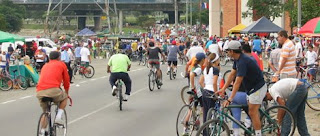
Street Food
Of course, whenever you think of streets in developing countries the smell of sketchy meat cooking on the corner wafts into your sensory memory. Welcome to Colombia! Chuzos, or meat kabobs (usually chicken), are accompanied by a small white corn arepa and a mayo/ketchup sauce. You can also find a wide-array of fried food being sold anywhere in the country, including empanadas (corn flour crust stuffed with meat and potatoes), buñuelos (fried cheesy dough with a slight sweet twinge), or arepas con huevo (thin arepas cut in half and fried with an egg inside). There are even small establishments that will deliver the food straight to your car, an informal version of a Colombian drive-thru. But my favorite, and healthier option, is always the fresh fruit. You can buy a cup of guayaba (guava) and mango with salt and lime, sandia (watermelon), papaya, piña (pineapple), or fresas (strawberries). It costs 1,000 pesos or about 35 cents, and, whoever is running the little stand will pick out a whole fruit and cut it up in front of you, fresh! You can also buy whole papayuelas, granadillas, apples, oranges, bananas, and avocados in bulk or individually. Men will be pushing wheelbarrows topped off with stalks of bananas for sale, and then there are always the men pushing long carts with a wide array of your daily fruit and veg through neighborhoods shouting their own song featuring the special of the day. Or, if you are feeling a bit more adventurous, you could even ask for a juice in a water or milk base, resulting in a tropical milkshakesque delight. I already know what I am going to miss most about Colombia...
Street Performers
One of my favorite reasons for choosing to walk through the city is to be able to stop and watch the street performers. Jugglers, unicycle riders, mimes dressed in fatigues, or saxophone players dressed as Santa are all an easy source for amusement. My favorite was a man who had dressed his Jack Russel Terrier up as an old woman and danced with her to classic music, and at the end the dog did a back flip landing in his arms to great applause. Most of these performers will stand in busy intersections and try to collect a few coins from the people waiting in cars at a red stoplight. I find that taxi drivers usually collaborate, as well as most other people if the show was good. Performers will also board inter-city buses to serenade you with their gangster wrap or off-tune guitar ballads, and I must say I am a sucker to any kid who puts himself out to a captive audience rocking his socks off.
Street Owners
From where I come, people usually consider the street public property. And I guess it still is here. But any time there is a wide stretch of street in an area where people want to park, people suddenly appear out of nowhere demanding money for parking in their strip as if they owned the street. And nobody seems to complain, given that whoever they tip 500-1000 pesos makes sure their car is safe for however long they are off entertaining themselves off the street. When I have asked friends here if there is some sort of cooperative or organized rotation of street owners, they say it is just first-come, first-serve. Competitive business, eh?
Street Dwellers
Given the large amounts of displaced people, impoverished people, and just plain poor people, you can find people sleeping in the stoops of even the nicest of Medellin's neighborhoods. I hate that my heartstrings are stretched out and don't feel a sympathetic pull whenever I walk by a dirty blanket with mismatched socks sticking out like Dorothy's wicked witch, but it is so common that the street dwellers and their begging whine just blend in with the rest of the landscape.
Street Cleaners
One of the aspects of the city that impresses me the most is its continual cleanliness. Several decades ago Medellin was the pioneer of a street cleaner project, contracting people to walk around the city with huge trash bins sweeping up trash, debris, leaves, and ugliness. Not only does it create lots of jobs, but it means that the morning after a riotous futbol match you can't find a trace of confetti nor a single beer bottle.
Street Workers
Any major city wouldn't be complete without prostitutes, and Medellin has its fair share. Driving through certain streets at night you can find women of questionable biological sex flipping their platinum-blonde hair and cocking their wrists against their curvey hips. Or, walking through parts of the Centro during the day you can conveniently find similar women waiting outside of cheap hotels. Colombia has a huge problem with children being exported and sold as sex slaves, and Medellin is known for their 12-year old street workers. Thankfully I haven't had the opportunity of meeting one myself.
Street Art
Compared to Berlin or San Francisco Medellin does not have incredible graffiti, but there are some walls that are tastefully decorated. I find that there is less 'tagging' and more artistic portraits or scenes, actually adding class to otherwise scraggly streets. Of course walls are also a free source of advertisement, so whenever looking for a new dance studio, mechanic, or concert just look to the walls around heavily trafficked intersections.
Street Vendors
Did you know that Colombia pirates the second largest amount of movies and video games, after China? Well they do, and you can find hundreds of copies of the latest blockbusters for sale on the street, $5.000 pesos each. Belts, flowers, shoes, shoe repairmen, stolen belongings at garage-sale prices, snail slime (supposedly it has healing powers), vegetable graters, watch bands or batteries, jeans--you name it, they sell it. I love wandering through the Centro and listening to the vendors hawking their wares, wondering what use anyone would have for that.
In the street, anything can happen...




